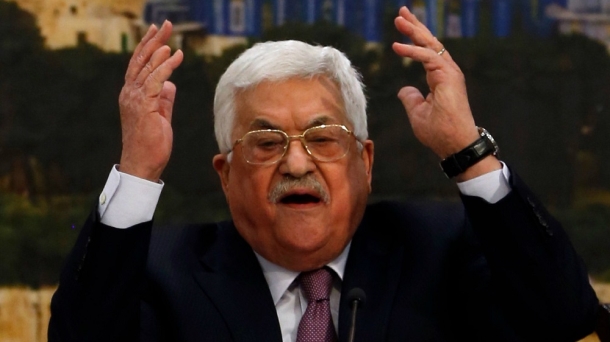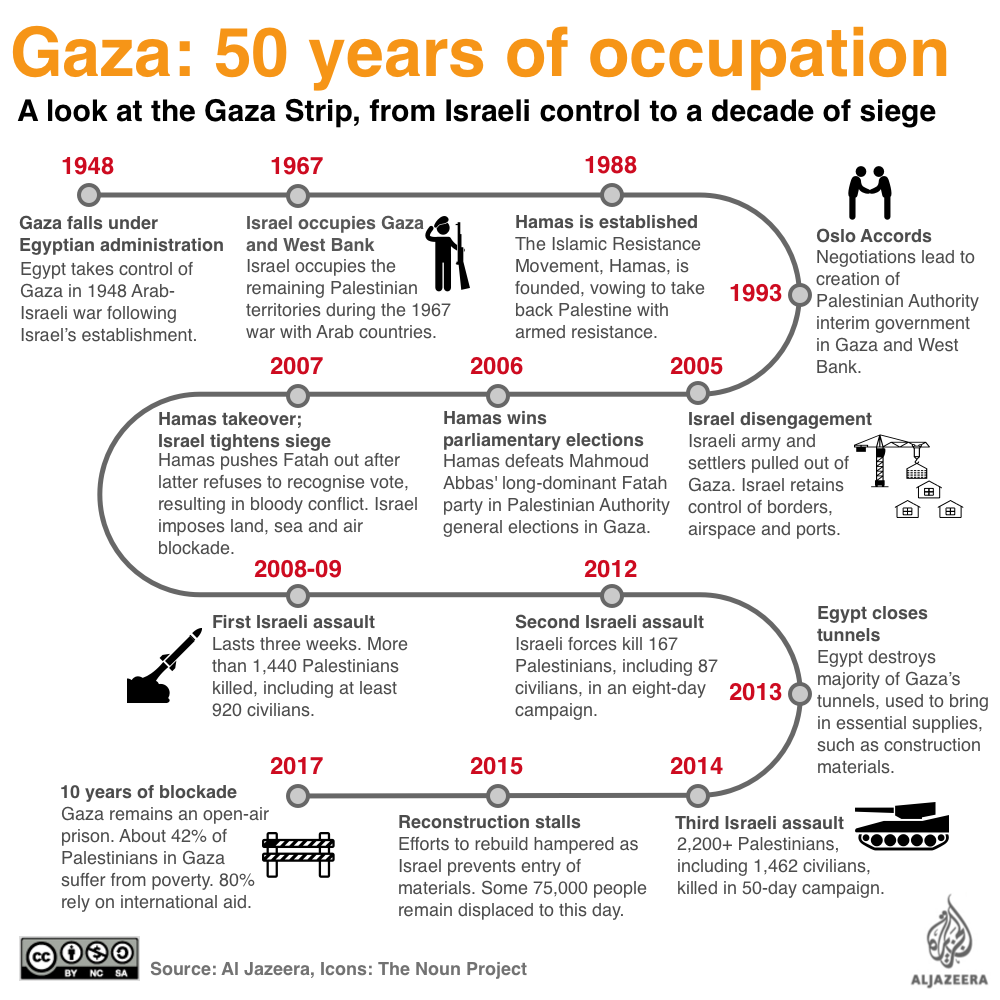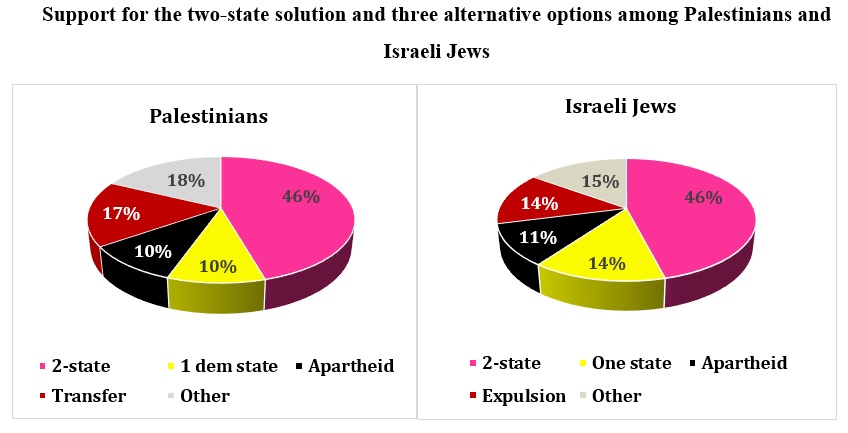
While Israel has labored to redefine the status of its military occupation from what is meant to be a temporary situation to a permanent one, the violence of occupation is highlighted every day. The ineptness of the Palestinian leadership, Arab politicking and a new, albeit still vague, strategy by the US administration - termed the ‘Deal of the Century’ - are creating new obstacles ahead of the Palestinian fight for freedom. For change to occur, the Palestinian people must reclaim their centrality in the struggle for Palestine.
Introduction:
June 5, 2018 marked the 51st anniversary of the Israeli Occupation of East Jerusalem, the West Bank and Gaza. But, unlike the massive popular protests (1) that preceded the commemoration of the Nakba — the catastrophic destruction of Palestine in 1948 — on May 15, the anniversary of the Occupation hardly generated equal mobilization. The unsurprising death of the “Peace Process” and the inevitable demise of the “two-state solution” has shifted the focus from ending the Occupation, per se, to the larger and more encompassing problem of Israel’s colonialism throughout Palestine.
The grassroots mobilization in Gaza and the West Bank, and among Palestinian Bedouin communities in the Naqab desert, is, once more, widening the Palestinian people’s national aspirations. Thanks to the limited vision of the Palestinian leadership, these aspirations have, for decades, been confined to the West Bank. In some sense, the “Israeli Occupation” is no longer an occupation as per international standards and definitions. It is merely a phase in the Zionist colonization of historic Palestine, a process that began more than 100 years ago, and carries on to this date.
Israeli politicians have, for years, openly debated the annexation of the West Bank (2), especially areas that are populated with illegal Jewish settlements, or colonies, which are built contrary to international law. These settlements, which Israel has been building in the West Bank and East Jerusalem over the last five decades, are not meant to be temporary structures. Dividing the West Bank into three zones — areas A, B and C, each governed according to different political diktats and military roles — has little precedent in international law.
Gaza is an “occupied territory” in name only, without any of the humanitarian rules of military occupation being applied. In the 11 weeks - between March 30 and June 8 - alone, nearly 130 unarmed protesters, journalists and medics have been killed and over 13,500 wounded, yet the international community and law remain inept, unable to face or challenge Israeli leaders, or to overpower the equally cold-hearted American vetoes in the UN Security Council. (3) Considering that anywhere between 600,000 and 750,000 Israeli Jews now live in the Occupied Territories, and that the largest illegal settlement, Modi’in Illit, houses more than 64,000 settlers, one has to wonder what form of military occupation blueprint Israel is implementing, anyway. (4)
This disheartening reality, however, is allowed to perpetuate because Israel’s main benefactor, the United States government, continues to create the needed political space for Israel to continue with its colonization schemes of Palestine, unhindered. While each American administration has played a role in aiding the Israeli colonial project, Trump’s pro-Israel doctrine is proving to be a most dangerous game-changer.
 |
| Gaza - 50 Years of Occupation (Aljazeera) |
What ‘Deal’?
Upon his return from a recent visit to Washington, Israeli Prime Minister, Benjamin Netanyahu, revealed in more detail why the long-anticipated plan of the US Administration of President Trump has no basis in reality insofar as bringing peace to the region. Netanyahu told his Cabinet that there are “no concrete details” to report on the US peace plan. (5) One has to suspect that the “plan” was, all along, the US disavowal of the so-called peace process and the dropping of the “honest peace broker” act altogether.
In fact, that much has been achieved, especially with the US decision last December to accept Israel’s illegal annexation of Occupied East Jerusalem and agree to move the US embassy from Tel Aviv to Jerusalem. Since then, Israel has initiated a clear strategy to annexing the West Bank. Its top officials are contending that the “two-state solution” is not even deserving of a conversation. “We are done with that,” said Israel’s Education Minister, Naftali Bennett, in recent remarks to students in New York. “They have a Palestinian state in Gaza.” (6)
The Palestinian Authority (PA) of Mahmoud Abbas is, thus, left with an unenviable position. It is lashing out left and right, convulsing like a wounded animal. It is hard to imagine that, at the moment, Abbas is orbiting within a grand strategy of any kind. Random statements, attacks on his Palestinian rivals, the Israelis and the Americans – mostly for betraying him – is all that seems to keep his name in the news. “May God demolish his home,” was one of the statements attributed to the Palestinian leader, in response to Trump’s decision regarding Jerusalem. (7)
While it is not clear whether Trump is guided by a clear strategy, it is almost certain that the flamboyant American leader does not base his strategy, however erratic, on Abbas’ pleas to God. Whatever little we know about Trump’s ‘deal’ points to the fact that Palestinian rights are of no essence. Instead, the centre of US-Israel strategy will be the targeting and isolation of Iran, with the help of Saudi Arabia and other Arab Gulf states. (8) Moreover, the ‘deal’ seems to include the isolation of the Palestinian leadership as well, even a quisling one like that of the West-backed Abbas government, from playing any part in Palestinian or regional politics. (9)
10 Things You Need to Know about 'Deal of the Century' (The Palestine Chronicle)
On November 18, the US State Department took its first step towards severing its ties with the Palestinian Liberation Organisation (PLO). (10) It first decided to shut down its office, then agreed to keep it open but ‘with limitations’. This was followed by several steps by both Israel and the US to downgrade the status of the PA and to choke it from badly needed funds. (11)
If the message was not clear enough, it became clearer during a visit by Saudi Crown Prince, Mohammed Bin Salman, to the US. In comments made before leaders of American Jewish organizations in New York, Bin Salman said this about the Palestinians: “In the last several decades the Palestinian leadership has missed one opportunity after the other and rejected all the peace proposals it was given. It is about time the Palestinians take the proposals and agree to come to the negotiation table or shut up and stop complaining.” (12)
Interestingly, these comments are a rehash of an old mantra that has long occupied the halls of power in Washington, one that was reiterated by former top Israeli diplomat, Abba Eban, that “the Arabs never miss an opportunity to miss an opportunity.” (13) What has changed, since Eban uttered these words many years ago to blame Arab countries for his country’s transgressions and failure of the so-called ‘Peace Process’, is that the ‘Arabs’ are no longer a major factor in the equation, as Palestinians are left in this battle alone. Equally tragic is that old Zionist mantras are now being rediscovered and utilized by an Arab leader.
Indeed, times have changed.
Winning Time
Trump’s decision to move the US embassy from Tel Aviv to Jerusalem was only a sign of the rapidly changing discourse on Palestine and Israel. It was the final proof that the US-sponsored ‘peace process’ has collapsed, that the ‘two-state solution’ was a mirage, that the ‘negotiation table’ was a metaphor for American dominance in the region. It merely created a political space for the ‘moderates’ to sit alongside Israel, and for the ‘radicals’ to be shunned and isolated.
The embassy decision was made on December 6, 2017 and implemented on May 14, 2018. All Arab statements dissuading the US from making its move proved worthless before Trump’s determination and Israel’s growing sense of invincibility. The final statement, presented by the Arab League foreign ministers in Cairo last December, was an example of the lacklustre language which, unsurprisingly, proved ineffective: “The decision has no legal effect ... it deepens tension, ignites anger and threatens to plunge the region into more violence and chaos.” (14) "The Arab League statement made no mention of economic sanctions," Reuters reported. (15) No surprises there.
The Palestinians needed their Arab brethren to articulate a strong, unified position on the issue, without hesitating to explore new political routes and put real, tangible pressure on the US and Israel to relent. This did not happen. Instead, what happened is that Bin Salman called on Palestinians to ‘shut up’, to the delight of Zionist leaders in New York. This changing discourse, however, is yet to reach the PA in Ramallah. The leadership, which has downgraded the Palestinian struggle and wasted precious years chasing after the proverbial American political ‘carrots’ and financial handouts, is yet to be held accountable.
If the Palestinian leadership had a minimal degree of accountability it would have, as soon as Trump made his decision on Jerusalem, issued a heartfelt apology to the people for all the squandered time, energy, and blood. It would have immediately undertaken a total overhaul within its ranks, activated all PLO institutions; brought all factions together, under the umbrella of the PLO, to declare a new strategy regarding the increasingly bleak-looking future.
But, the signs are not promising. Abbas is further barricading himself behind a particular clique within his own faction, the Fatah ‘Old Guard’ that has reaped much wealth and power since the signing of Oslo, refusing to concede to a younger, more capable generation of leadership that might be able to unify the Palestinian ranks. Despite his repeated failures, aging Abbas remains the chair of the Palestine Liberation Organization (PLO), President of Palestine, head of the Palestinian Authority, chair of the Fatah Party, and so on. As his official titles grow, his vision dims and his health deteriorates. In recent weeks, he has been hospitalized several times, prompting questions about the future of Palestinian leadership after his death, especially since he is yet to name a successor.
Like Abbas, the PA has become an obstacle to Palestinian freedom. A recent survey conducted by the Palestinian Center for Policy and Survey indicated that the majority of Palestinians put the blame mostly on Israel and the PA for the Gaza siege, and that they mostly believe the PA has “become a burden on the Palestinian people.” (16) It is hardly surprising that, as of March 2018, 68 percent of all Palestinians want Abbas to resign. (17)
What makes the “Deal of the Century” particularly dangerous in this context is the truth that the PA cannot be trusted to serve the interests of the Palestinian people. It has played its role, assigned by Israel and the United States, so well and for so long, serving as the local arm in the subjugation of Palestinians, thwarting their protests and ensuring the demise of any political initiative that does not revolve around the glorifying of Abbas and his goons. It is hardly comforting that much of PA foreign policy in recent years was invested to ensure the complete economic and political isolation of impoverished Gaza, to pressure his rivals in the Islamic movement, Hamas, and to purge his enemies within his own Fatah party. (18) Concurrently, it continued to adhere to an empty political discourse with little basis in reality.
The ‘Two-State’ Illusion
The PA, joined by the Europeans and the rest of the world, continues to speak of a ‘two-state solution’ as the only viable answer to the conflict. But, why has such an impractical ‘solution’ continued to be the official policy of many governments, despite the fact that no sincere effort was ever truly made to ensure its implementation?
The answer partly lies in the fact that the two-state solution was never devised for implementation from the onset. (19) Just like the ‘Peace Process’ and other pretenses it aimed at promoting among Palestinians and Arabs, the idea that there is a goal worth striving for, despite it being unattainable. But, even that unachievable goal was, itself, conditioned on a set of demands that were unrealistic at the outset. Historically, in order for Palestinians to be included in the discussion, they needed to renounce violence (their armed resistance to Israel’s military occupation), consent to various UN resolutions (even if Israel still rejected those very resolutions), accept Israel’s ‘right’ to exist as a Jewish state, and so on. That yet-to-be-established Palestinian state was also meant to be demilitarized, divided between the West Bank and Gaza, and separated from Occupied East Jerusalem. (20)
Many new ‘creative’ solutions were also offered to alleviate any Israeli fears that the non-existent Palestinian state, in case of its establishment, never posed a threat to Israel. At times, discussions were afoot about a confederation between Palestine and Jordan and, at other times, as in a recent proposal by Naftali Bennett, making Gaza a state of its own and annexing to Israel 60 percent of the West Bank. (21)
When Israel’s allies, frustrated by the rise of the right wing in Israel and the obstinacy of Prime Minister Benjamin Netanyahu, insist that time is running out for a two-state solution, they express their worries in the form of tough love. Israel’s settlement activity is “increasingly cementing an irreversible one-state reality,” were the supposedly ominous, departing words by former Secretary of State, John Kerry, in his major policy speech. (22)
Kerry then warned Israel that it will eventually be left with the option of placing Palestinians “under a permanent military occupation”, depriving them “of the most basic freedoms,” thus paving the ground for a “separate and unequal” scenario. Yet, while warning that a two-state solution possibility is disintegrating, few, including Kerry himself, bothered to try to understand the reality from a Palestinian perspective.
For Palestinians, the debate on Israel having to choose between being democratic and Jewish is ludicrous in the first place. For them, Israel’s democracy applies fully to its Jewish citizens and no one else, while Palestinians have subsisted for decades behind walls, fences, prisons and besieged enclaves, like the Gaza Strip. And with two separate laws, rules and realities applying to two separate groups in the same land, Kerry’s ‘separate but unequal’ Apartheid scenario had already taken place the moment Israel was established in 1948, on the ruins of historic Palestine.
 |
| Palestinian-Jewish poll on the two-state solution (Source: Palestinian Center for Policy and Survey Research) |
Life after Abbas
Fed up by the illusions of their own failed leadership, two-thirds of Palestinians now agree that a two-state solution is not possible. (23) And that margin keeps on growing as fast as the massive Israeli illegal settlement enterprise dotting the Occupied West Bank and Jerusalem. But who could succeed Abbas and will his successor make any difference considering the skewed political setup of the PA?
Some of the names of potential successors that have been scrutinized in media reports include Abbas’ arch enemy, Mohammed Dahlan, who has been pushed out of the West Bank following accusations of corruption. Dahlan has been waiting for the right moment to stage his comeback through Gaza, considering that the West Bank route has been largely shut off. Other names, such as Jibril Rajoub, Mahmoud al Aloul, Nasser Qidweh and Majed Faraj, signals that the successor is likely to emerge from the PA’s security circle, known for its heavy-handedness against Palestinians and willful cooperation with Israel.
Aside from some tactical changes in policies, the new leader is unlikely to espouse a new vision or to have major impact on the Palestinian national movement due to Fatah’s internal power play and current structure of the PA, which lends itself to cooperating with Israel and its partners. The PA is simply incapable of deviating from the status quo and is too inept to take the courageous choice of reconciliation between all Palestinian groups.
It is obvious that Abbas is soon to depart the political scene, either because of an internal Fatah coup (24), or as a result of failing health. Either way, the future of Palestine cannot be left to his followers, to manage as they see fit in order to protect their own interests. These potential successors are likely to adhere to the same tired political discourse of Abbas and his insistence on a two-state solution, which is long dead and buried.
In fact, to say that the two-state solution is now dead is to subscribe to the mistaken assumption that it was once alive and well. But, even if we are to argue that the two-state solution had any credibility in the past, such a possibility has all but vanished following the US Embassy move, the massive expansion of the illegal Israeli Jewish colonies in the West Bank, and the ‘Deal of the Century’ which aims to purge Palestinians out of the discussion and to build a regional Israeli-Arab alliance at the expense of Palestine.
Popular Resistance
What can the PA do now? It is trapped in its own imprudence. On the one hand, its financial sponsor in Washington is turning off the money source, while on the other the Palestinian people have lost their last iota of respect for its so-called “leadership.”
Trump’s “Deal of the Century” may inadvertently mix up the cards, leading to a “much-needed reckoning for all other parties involved,” argued Anders Persson. (25) One option available for the Palestinian people is the expansion of the popular mobilization model, which has been manifesting itself at the Gaza-Israel fence for many weeks.
The US-PA fallout and the looming destruction of the status quo might be the opportunity the Palestinian people need to unleash their power through mass mobilization and popular resistance at home, coupled with an active role for Palestinian communities in the diaspora. The Palestinian people are becoming increasingly aware of these changing dynamics, that a political transition is upon them, one that demands a greater role for Palestinian society, away from Abbas and his insatiable thirst for American money and political validation. (26)
The mass mobilization at the Gaza border is that very expression of the renewed efforts of Palestinians to reclaim their central role in the struggle, independent from American roadmaps, Arab politics and factional allegiances. Yet, as the casualty count keeps climbing, the deafening silence also continues. Tellingly, many of those who long chastised Palestinians for using armed resistance against the Israeli Occupation are nowhere to be seen, while children, journalists, women and men are all targeted by hundreds of Israeli snipers who dot the Gaza border.
Photo 4 Deaths at Gaza Border (NYT)
Israeli officials are adamant. Defence Minister, Avigdor Lieberman, perceives his war against the unarmed protesters as a war on terrorists. He believes that “there are no innocents in Gaza.” (27) While the Israeli mindset is not in the least surprising, it is emboldened by the lack of meaningful action, or outright international silence to the atrocities taking place at the border. Still, tens of thousands of protesters, raising Palestinian flags, continue to hold their massive rallies throughout Gaza. Despite the high death toll and the thousands maimed, they return every day with the same commitment to popular resistance that is predicated on their collective unity.
Despite the violent Israeli response, the Gaza protests model has proven its capabilities in exposing the criminal practices of the Israeli army and is refocusing the attention back on to Gaza. Expanding this form of resistance to the West Bank is a must. Among the likely achievement of this strategy is to once more unifying the Palestinian people around the same rally cry for freedom. But none of this can take place with the same old faces, the same tired discourse and the same dead-end politics.
Palestinians must now continue to count on themselves; to stay focused on formulating a proper strategy that will serve their own interests in the long run, the kind of strategy that transcends factionalism and offer all Palestinians a true roadmap to their coveted freedom. The popular resistance in Gaza, whose roots are extended to 100 years in history, can only be a step in the right direction.
Conclusion: Back to Square One
What Trump has done will have terrible consequences on the region for years to come. But one of the early outcomes of his doctrine is that it has exposed the peace process as a complete charade and the US role for what it is - neither honest nor fair. But, it has also exposed the Palestinian leadership, for all of its failings and self-serving politics.
If Palestinians are to start anew, they have to commence their journey with a new political discourse, with new blood, and a new future outlook that is based on unity, and a strategy that is designed around the idea of unleashing the power of the Palestinian people.
 |
| Ramzy's book |
(1) Hedaya al-Saeidi (2018) '123 Palestinians martyred by Israel in Gaza since March', Anadolu News Agency, 3 June, https://www.aa.com.tr/en/middle-east/123-palestinians-martyred-by-israel-in-gaza-since-march/1164274 (Accessed 4 June 2018)
(2) Jeremy Sharon (2017) 'Bennett: We Will Annex Ma'aleh Adumim First and Then All Of Area C', Jerusalem Post, 2 January, https://www.jpost.com/Arab-Israeli-Conflict/Bennett-We-will-annex-Maaleh-Adumim-first-and-then-the-rest-of-Area-C-477236 (Accessed 4 June 2018)
(3) Rick Gladstone (2018) 'U.S. Vetoes U.N. Resolution on Gaza, Fails to Win Second Vote on its Own Measure', New York Times, 1 June, https://www.nytimes.com/2018/06/01/world/middleeast/gaza-israel-palestinians-.html (Accessed 4 June 2018)
(4) Zena Tahhan (2017) 'Israeli Settlements: 50 Years of Land Theft Explained', Al Jazeera, 21 November, https://interactive.aljazeera.com/aje/2017/50-years-illegal-settlements/index.html (Accessed 4 June 2018)
(5) (2018) 'Trump’s peace plan likely shelved after Abbas curses US envoy', World Israel News, 21 March, https://worldisraelnews.com/trumps-peace-plan-likely-shelved-abbas-curses-us-envoy/ (Accessed 4 June 2018)
(6) Taly Krupkin (2018) 'Israeli Minister in U.S.: Palestinians Had Their Chance in Gaza, but They Turned It into Afghanistan', Haaretz, 7 March, https://www.haaretz.com/israel-news/.premium-bennett-palestinians-turned-gaza-into-afghanistan-never-again-1.5885480 (Accessed 4 June 2018)
(7) (2018) 'Palestinian leader calls Donald Trump's peace efforts 'slap of the century', Telegraph, 15 January, https://www.telegraph.co.uk/news/2018/01/15/palestinian-leader-calls-donald-trumps-peace-efforts-slap-century (Access 4 June 2018)
(8) (2018) 'After the Deal: A New Iran Strategy', The Heritage Foundation, 21 May, https://www.heritage.org/defense/event/after-the-deal-new-iran-strategy (Accessed 4 June 2018)
(9) (2018) 'Mustafa Barghouti: New settlements what “Deal of the Century” looks like', Middle East Monitor, 25 May, https://www.middleeastmonitor.com/20180525-mustafa-barghouti-new-settlements-what-deal-of-the-century-looks-like (Accessed 4 June 2018)
(10) (2018) 'U.S. Says PLO Office Must Close After Palestinians Call To Prosecute Israel', NPR, 18 November, https://www.npr.org/2017/11/18/565095140/u-s-says-plo-office-must-close-after-palestinians-call-to-prosecute-israel (Access 4 June 2018)
(11) Eric Cortellessa (2018) 'White House mulling possible move against Palestinian mission over ICC push', Times of Israel, 23 May, https://www.timesofisrael.com/white-house-mulling-possible-move-against-palestinian-mission-over-icc-push (Accessed 5 June 2018)
(12) The Forward and Aiden Pink (2018), ‘Palestinians Should ‘Shut Up’ or Make Peace, Saudi Crown Prince Told Jewish Leaders', Haaretz, 1 May, https://www.haaretz.com/middle-east-news/palestinians-should-shut-up-or-make-peace-said-saudi-crown-prince-1.6036624 (Accessed 5 June 2018)
(13) Rami G. Khouri, Karim Makdisi and Martin Wahlisch (2016) 'Interventions in Conflict: International Peacemaking in the Middle East’, London, Palgrave Macmillan, p.111.
(14) (2018) 'Arab states urge U.S. to abandon Jerusalem move', Reuters, 9 December, https://af.reuters.com/article/worldNews/idAFKBN1E30R9 (Accessed 5 June 2018)
(16) (2018) 'Public Opinion Poll No (67)', Palestinian Center for Policy and Survey, 27 March, http://www.pcpsr.org/sites/default/files/poll%2067%20full%20text_March2018_%20English.pdf (Accessed 2 July 2018)
(18) Ali Sawafta, Nidal al-Mughrabi, Stephen Farrell (2018) 'Palestinian forum convenes after 22 years, beset by division', Reuters, 30 April, https://www.reuters.com/article/us-israel-palestinians-plo/palestinian-forum-convenes-after-22-years-beset-by-division-idUSKBN1I1101 (Accessed 5 June 2018)
(19) Richard Falk (2018) 'Let the Two-State Solution Die a Natural Death', Foreign Policy Journal, 8 June, https://www.foreignpolicyjournal.com/2018/01/08/let-the-two-state-solution-die-a-natural-death/ (Accessed 5 June 2018)
(20) Aharon Ze’evi Farkash, 'Key Principles of a Demilitarized Palestinian State', Jerusalem Center for Public Affairs, http://jcpa.org/demilitarized_palestinian_state/ (Accessed 6 June 2018)
(21) Taly Krupkin (2018) 'Israeli Minister in U.S.: Palestinians Had Their Chance in Gaza, but They Turned It into Afghanistan'.
(22) Ali Abunimah (2016) 'Kerry gives eulogy for two-state solution', Electronic Intifada, 28 December, https://electronicintifada.net/blogs/ali-abunimah/kerry-gives-eulogy-two-state-solution (Last Accessed 6 June 2018)
(23) (2016) ‘Poll: Two thirds of Palestinians think two-state solution is doomed, Abbas should resign’, Maan News, 14 December,http://www.maannews.com/Content.aspx?ID=774410 (Last Accessed 8 June 2018)
(24) (2015) 'Fatah rejects reports of reconciliation with Dahlan as 'baseless'', Maan, 8 December, http://www.maannews.com/Content.aspx?id=768885 (Accessed 2 July 2018)
(25) Anders Parsson (2018) 'What will Trump's 'ultimate deal' mean for Palestinians?', Aljazeera, 27 March, https://www.aljazeera.com/indepth/opinion/trump-ultimate-deal-palestinians-180327082942844.html (Accessed 2 July 2018)
(26) (2017) 'Poll: Majority of Palestinian public want Abbas to resign', Maan News, 22 September, https://www.maannews.com/Content.aspx?id=779160 (Last Accessed 6 June 2018)
(27) Tovah Lazarof (2018) ''There Are No Innocents in Gaza,' Says Israeli Defence Minister', Jerusalem Post, 8 April, https://www.jpost.com/Arab-Israeli-Conflict/There-are-no-innocents-in-Gaza-says-Israeli-defense-minister-549173 (Accessed 5 June 2018)
